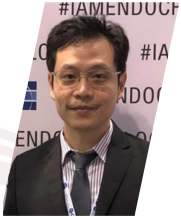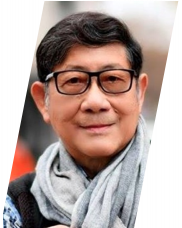
- This event has passed.
DiCE Program 2019 – Thailand
Session Dates:
February 28 – March 2
Speakers & Lecture Synopsis
FOOT CARE IN THAILAND:
A Private Care Model with Public Health Perspective
Prof. Thep Himathongkam, MD, FACP, FACE
Founder and CEO, Endocrinologist, Theptarin Hospital, Thailand
Chronic foot wounds and foot amputation is a common complication from diabetes that brings serious damage to quality of life and extremely costly. Then why foot care is not a part of routine diabetic care that we commonly found and easily accessible for diabetic patients?
The heart to foot care services is multidisciplinary teamwork. In a country where “podiatrist” or foot doctor does not exist, foot care services must be performed through coordination between medical doctors, surgeons, nurses, physical therapists, and pedorthists. Working in coordination is a challenge in the medicine world as all professions tend to be trained to work as a soloist. The place where one can expect to host these multidiscipline team members would be medical schools or large governmental hospitals. In reality, the place where full resources are available often accompany with too segmental management system which, although individual members may wish to form a team, system prevents it.
The development of foot care in Thailand started 30 years ago at Theptarin Hospital, a small private clinic founded by an endocrinologist with a dream of building a team care model for diabetes management with focus on patient education. Foot care was naturally a part of the work as more and more patients come present with foot ulcers and seek all ways to avoid amputation. Foot care knowledge and team slowly formed in this private setting.
Diabetic foot wound consumes gigantic amount of health care resources and thus must be a public health concern. In a country where foot care is still neglected and no foot care is taught in medical school, government needs to be informed, educated, and advised in order to direct the policy towards combating the cause. Theptarin Hospital has transferred itself from a private care setting to a philanthropic-like organization to work hand-in-hand with various governmental organizations to drive for the development of foot care in Thailand. The star-shooting goal was to reduce foot amputation by 40% in 5 years (2013 – 2017), but Thailand achieved 80%.
PROF. EMERITUS THEP HIMATHONGKAM
Endocrinologist, MD (U. of Wisconsin, Madison), FACP (USA), FACE (USA)
Professor Thep received his doctoral degree in Medicine from the University of Wisconsin, Madison in 1969. He completed his training in medicine at New England Deaconess Hospital and his training in endocrinology at Peter Bent Brigham Hospital (now Brigham and Women’s Hospital), Harvard University in 1974.
Professor Thep is the Founder and Chief Executive Officer of Theptarin General Hospital in Bangkok, Thailand, one of the leading comprehensive diabetes centers in the world working from complications all the way through primary prevention.
Professor Thep introduced the teamwork approach in diabetes to Thailand in 1980s. He continuously advocates for the acceptance of diabetes educators, dietitians, and foot care specialists among the physician community and the public, and is the founder of the Thai Society of Diabetes Educators. He works with leaders in diabetes from other Southeast Asian countries in laying out regional standards for diabetes educators.
Professor Thep and his diabetes team deeply engage in the cooperation with Thai universities in the production of dietitians, foot care specialists, and exercise physiologists, to feed the need of health care facilities across Thailand. Moreover, the team also involve with the National Health Security Office in the implementation plan of chronic disease prevention.
THEPTARIN DIABETES STAGING:
A Systematic Individualized Care Plan for People with Diabetes
Ekgaluck Wanothayaroj, MD
Endocrinologist, Theptarin Hospital, Thailand
Each person with diabetes is different. Do we have different standard sets of care for each of them? Diabetes is so complicated; what one measurement can tell how well we do in controlling it? What one tool do we use to communicate the progression of diabetes between healthcare team members as well as person with diabetes and their care takers? Dividing diabetes into different stages has been discussed in the academic world for quite sometimes, but actual implementation in clinical practice has yet to be documented.
Starting more than 10 years ago, diabetes team at Theptarin Hospital has drafted its first “Theptarin Diabetes Staging (TDS)” version. Today, detail of TDS has been updated several times with additional clinical experiences and advancement in new medical knowledge. Today, TDS has turned into the backbone for all multidisciplinary care team members to base their care stands on. Today, quality of diabetes care is measured by monitoring TDS. Maybe, in the near future TDS could have a role in health care financing as well.

EKGALUCK WANOTHAYAROJ, MD
Endocrinologist, BA Med. (Thailand), Board of Internal Medicine (Thailand), Board of Endocrinology (Thailand)
Dr. Ekgaluck received his medical degree from Chulalongkorn University, Thailand in 2002. He completed his training in internal medicine from Khon Kaen University and fellowship in endocrinology from Ramathibodi Hospital, Mahidol University, Thailand in 2009
Dr. Ekgaluck was a lecturer at Khon Kaen University prior to joining Theptarin Hospital in 2011. At Theptarin, he is the leader in the implementation of Theptarin Diabetes Staging into practice for all multidisciplinary team members as well as the implementation of diabetes and cardiovascular screening process for early detection in hospital setting.
Dr.Ekgaluck is currently one of Thailand’s most-invited endocrinologist speakers, a subcommittee member of Thai Association of Diabetes Educator, and a subcommittee of the website of Thai Endocrine Society. He is the recipient of Etzwiler International Scholars 2018 from International Diabetes Center, Minnesota, USA.
Day 1 - Conference Proper
| 8:00AM | Registration |
| 8:30AM | Walk “Diabetes Escape” |
| 9:00AM | Opening Remarks Introduction to Theptarin |
| 9:10AM | Lecture 1 Open Forum |
| 10:30AM | Break – Refreshment |
| 10:40AM | Lecture 2 Open Forum |
| 12:00NN | Lunch |
| 13:00PM | Hospital Tour
|
| 14:30PM | Closing Remarks Awarding of Certificates Group Photo |
| 15:00PM | End of Session |
Hospital

Theptarin Hospital
3850 Rama 4 Rd., Phra Khanong, Bangkok 10110 Thailand
From Clinic to Center of Excellence
Prof. Thep Himathongkam was ahead of his time when he founded Theptarin in 1985, initially as a small clinic. As far back as three decades ago, he had already envisioned a model of holistic therapy for diabetes that aimed to empower patients who suffer from a disease that demands effective treatment and constant monitoring. The Theptarin Diabetes and Thyroid Center was created as a specialist in diabetes and thyroid management. While it opened with all but eight beds for overnight admission, the clinic was huge in its all-encompassing commitment to excellence in service, education for both healthcare professionals and patients, and to research. It was this emphasis on developing a three-pronged expertise that gave life to the first diabetes care team of Thailand which included an endocrinologist, a nurse to educate patients on diabetes, and a dietitian to support proper nutrition.
Seven years later, it evolved into the Theptarin Hospital, acquiring new skills, equipment, and team specialists in order to meet the ever-changing needs of patients. The Hospital began to offer 24-hour services, distal bypass surgery, hyperbaric medicine, and even launched Thailand’s first foot clinic specializing in diabetic foot wound care and prevention.
Because continuous evolution had always been at the core of its quest for excellence, when scientific studies revealed in 2005 that diabetes is a preventable condition, Theptarin Hospital jumped at the opportunity to further enhance its range of therapeutic services. From simply preventing diabetes-related complications, it set up a “Lifestyle Building” to also promote the prevention of diabetes and associated chronic diseases. Subsequently, the Hospital introduced its MEDE Health Solution Club and Weight Management Clinic to advocate healthy daily living, behavior modification, and optimal quality of life for both diabetes patients and the general public.
From a humble clinic with noble dreams, Theptarin Hospital has now become a standout amongst private
hospitals mainly because of its clear focus on developing high quality patient care – from expanded medical teams composed of specialists from diverse branches of healthcare to world-class facilities. Its passion to raise public awareness on diabetes also makes Theptarin Hospital a cut above the rest. The level of excellence achieved by the institution has made it a source of sought-after resource speakers and a training center for students and professionals from local and international healthcare establishments.
In addition, not only was Theptarin Hospital entrusted by the Thai government to train its staff in implementing nationwide behavior modification activities, it was also appointed in 2011 by the World Diabetes Foundation (Denmark) to serve as a center of excellence for training healthcare personnel throughout Southeast Asia. It continues to pursue increased awareness on the early detection and timely risk reduction of diabetes toward the prevention or prolonged onset of this most prevalent disease. Theptarin Hospital has also earned its stripes as the first thyroid center to offer complete diagnosis and treatment, acting as a transfer center for both domestic and international patients.
In 2015, a team of country’s leading cardiologists co-invested to open one of the most comprehensive
cardiology with services ranging from screening through interventions including complicated catheterization, open-heart surgeries, and 24-hour cardiac services. Cardiology team and diabetes team hold academic and service meetings monthly allowing flow of communication and making the care of the two specialties coherent and optimal.

